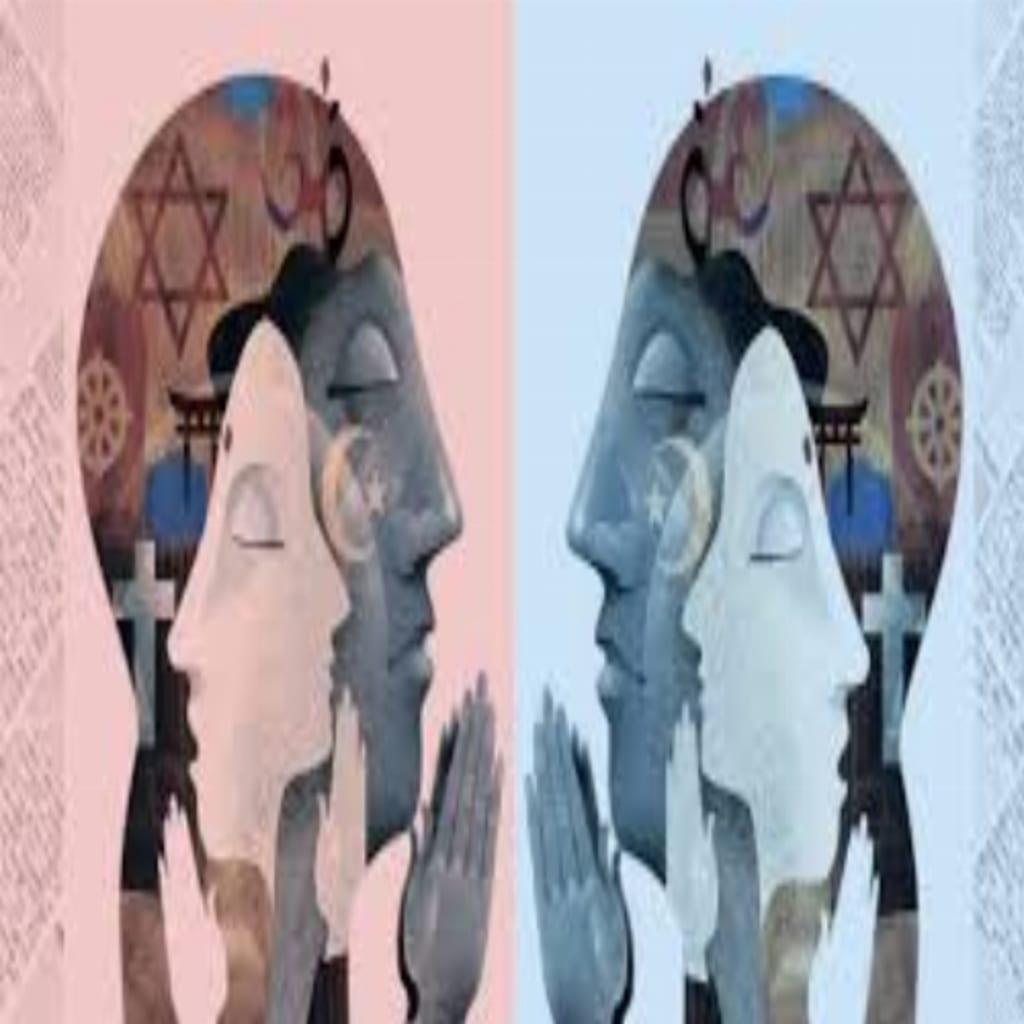Religions vs Human thoughts:
The dynamic between religion and human thought is complex and fascinating.

The dynamic between religion and human thought is complex and fascinating. Religion and its organized beliefs and practices often play an important role in shaping people's thinking and understanding of the world. But individual thoughts, characterized by personal reflection and rationalization, remain independent and change. In this article, we delve into the relationship between religion and ideas, exploring the differences and intersections.
Religion Is all about Belief Framework Religion is a multifaceted concept that includes an organized set of beliefs, rituals, moral codes, and practices that often revolve around the worship of a deity or gods. It provides a structured framework through which people understand God, the afterlife, and their purpose in the world. Several world religions, including Christianity, Islam, Buddhism, Hinduism, and Judaism, offer different belief systems and approaches to spirituality.
Main Points of Religion:
Belief in a higher power:
Most religions include a belief in a higher power, which may be one god (monotheism) or many gods (polytheism).
Scripture: Sacred texts and scriptures contain teachings and stories that guide religious beliefs and practices. Rituals and Worship: Religion often involves rituals and worship, such as prayer, meditation, fasting and congregational meetings.
Moral and Ethical Framework: Religions provide moral and ethical guidelines that dictate how followers should behave in various areas of life.
Community and identity: Religion often fosters a sense of community and identity by uniting people through shared beliefs and practices.
Thoughts:
The domain of individual cognition Unlike religion and its collective and structured nature, thoughts are essential to individual cognition. Thoughts encompass the entire spectrum of human mental processes, from problem solving and decision making to creative thinking and introspection. Thoughts are influenced by the individual and their unique experiences, upbringing, cultural background and belief systems.
Main aspects of the idea:
Independence:
Thoughts are personal and independent in nature. Each person has a unique thought process, perspectives and ways of interpreting information.
Critical Thinking:
The ability to think critically and evaluate information objectively is central to human thinking. It involves evaluating evidence, weighing multiple perspectives, and making rational decisions. Freedom of Religion: No particular belief system or dogma restricts thought. People are free to form their own beliefs, values and worldviews, whether or not they conform to religious teachings.
Adaptability:
Thoughts are adaptable and changeable. As people acquire new information and experiences, their thoughts and beliefs may evolve over time.
Philosophical and Existential Inquiry:
Some people engage in philosophical and existential inquiry to explore deep questions about the meaning of life, morality and the nature of existence. Interaction of Religion and Ideas:
Personal belief:
Individuals and#039; thoughts and beliefs can be influenced by their religious upbringing, experiences and religious teachings. Religion can have a significant impact on an individual and his thought processes by guiding his moral and ethical values.
Theological and Philosophical Reflection:
Religious thinkers, theologians and philosophers often engage in deep thinking and critical thinking to explore complex questions of faith, existence and ethics. This intellectual inquiry can lead to the development of advanced theological and philosophical concepts.
Interaction of faith and reason:
In certain religious traditions there is a constant dialogue between faith and reason. This means that people can try to reconcile their religious beliefs with critical thinking and rational analysis. The interaction of faith and reason can lead to rich theological and philosophical discussions.
In short, it can be stated that the relationship between religion and ideas is dynamic and multifaceted. Religion provides a structured framework for belief and practice that guides the moral and ethical values of its adherents. Thought, on the other hand, encompasses a person's broader thinking and reasoning, including personal reflection, critical thinking, and the formation of individual beliefs. The interaction between the two varies greatly between individuals and cultures, making it the subject of study and debate in fields such as philosophy, theology, and psychology. Understanding the complex relationship between religion and thought enriches our understanding of human belief and cognition.
About the Creator
Sarang Panhwar
Welcomes to my Account Hi i am here for you to share some hidden information's about the world that i gather for you i hope you will enjoy the reading and get more information's






Comments
There are no comments for this story
Be the first to respond and start the conversation.